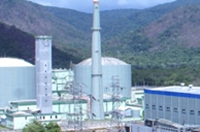Government keen to dilute nuclear liability bill: report
20 Sep 2013
Opposition leaders, security analysts and experts have questioned the United Progressive Alliance government's reported move to attempt a dilution of the Nuclear Liability Bill (NLB) to accommodate US concerns in taking bilateral nuclear commerce with India forward.
 According to a report by news agency ANI, a note by the cabinet committee on security (CCS) suggests that prior to his visit to the United States to attend this year's UN General Assembly session and to meet President Barack Obama on its sidelines, Prime Minister Manmohan Singh appears to be keen to have a diluted version of the NLB passed.
According to a report by news agency ANI, a note by the cabinet committee on security (CCS) suggests that prior to his visit to the United States to attend this year's UN General Assembly session and to meet President Barack Obama on its sidelines, Prime Minister Manmohan Singh appears to be keen to have a diluted version of the NLB passed.
According to a television channel, the CCS note details plans to bypass the International Atomic Energy Commission, which has raised questions.
Another channel said that the UPA government has sought the opinion of attorney general G E Vahanvati on the extent of the suppliers' liability.
Reports say that the government is keen on attracting huge foreign investment in nuclear power equipment, and is under pressure from the US to strike deals with American reactor builders like GE and Westinghouse, who see India's market for nuclear equipment as worth $175 billion.
To facilitate this, the Indo-US nuclear agreement was signed in 2008. It reversed a 34-year-old US ban on supplying nuclear fuel and technology to India.
In 2010, Parliament passed the controversial Civil Liability for Nuclear Damage Act, which creates a liability cap for nuclear plant operators for economic damage in case of an accident.
It also leaves nuclear suppliers free of most liability.
Critics and activists say that nuclear operators and suppliers should be jointly and absolutely liable for civil damages in the event of an accident, and that their financial liability must be unlimited.
Potential nuclear equipment suppliers, including the US, say India's nuclear liability law is too stringent.
They have particularly objected to clauses allowing the state-run Nuclear Power Corporation of India, which operates all the nuclear plants in India, to seek compensation from nuclear suppliers in case of an accident due to faulty equipment.
Vahanvati has told the government that it is up to the operator of a nuclear plant in India to decide whether to enforce this feature in a contract with a foreign supplier.
Government sources say Vahanvati's view was sought after questions from Russian and French suppliers.
The Nuclear Power Corporation of India Ltd is preparing to sign an agreement soon with Westinghouse for a nuclear plant in Gujarat.
The state-owned NPCIL has warned that indemnifying the foreign company could have serious ramifications.
























